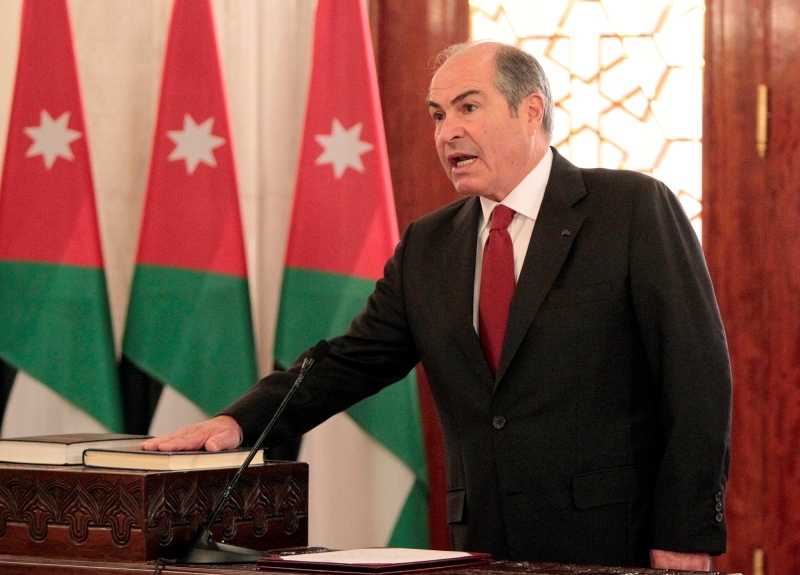The appointment of Hani al-Mulki to preside the Jordanian cabinet came during a critical economic stage in the country which currently suffers from incidents around, like borders’ closure in Syria and Iraq, and the flow of Syrian refugees. The Jordanian King Abdullah II may have appointed Al-Mulki to cope with the critical stage that dominates and drains the country with taxes imposed by the former government.
The Mulki’s government kicked off its works with a remarkable economic effort, by putting investments among its top priorities. Yet, the most urgent topics to tackle are economy and indebtedness, to put an end to people’s suffering. As in regard of its second priority, comes the implementation of the parliamentary and local councils elections.
Fahed al-Khitan, political writer, says that the cabinet’s members exceeded the needed number, and that the government was supposed to be more fit because the stage requires more dynamism. The writer doesn’t anticipate any changes in the main policies and strategies that were applied by the former government. Concerning the exterior affairs, Khitan noted that the government will tackle the interior affairs and won’t intervene in the topics.
Former Minister of Media Affairs, Nabil Al-Sharif sees that the governmental change came to push the economy forward and not to hold the elections. He adds that the former government suffered from weakness, and that the King is mostly concerned with the economic burden and the people’s suffering.
The 16th Government
It’s worth mentioning that Al-Mulki government in the 16th since King Abdullah ruled Jordan in 1999. The King didn’t choose a figure from the opposition for the presidency of the government to give the impression that his country overtook the “Arab Spring” to a new stage to retrieve the state’s status.
Yet, the royal choice went toward selecting a diplomatic and economist to lead the stage that may be a transitional one, preceding the parliamentary elections amidst many economic and political challenges and a tensioned entourage that affect the local area.
Descendant of a Political Family
The President Hani al-Mulki is a realistic personality, who looks at the scene from all its angles, and known by enjoying a capability to cope with the economic situation through a managerial constant manner, which he always adopted in previous ministerial positions he served in. Mulki is the descendant of a maven political family. His father Fawzi al-Mulki was a former PM during the rule of the late King Hussein bin Talal, and was known for a calm manner in coping with different cases, which led him to a significant success in political and economic positions he held since he entered the political field in the late eighties. Since then, al-Mulki family has been close to the Hashemite palace.
Remarkably, Hani al-Mulki has held the same position previously held by his father as PM, minister of foreign affairs, and the Jordan’s ambassador to Cairo.
Hani al-Mulki also played an important role in foreign policy, when he was a minister of foreign affairs in 2004. He was also appointed as a permanent delegate to the Arab League in 2008-2011 and worked as the King’s consultant from 2005-2007.
In addition to its political experience, the new PM’s also held economy-related positions including the ministries of water and irrigation, energy, provision, and industry. During his rule, the ministries focused on attracting the foreign investments. His close acquaintances say that al-Mulki gathers a political intelligence and an inclusive view to cope with economic instabilities, based on deliberate study of developmental projects that reflect positively on the economic growth rates.
On another hand, the strong personality of al-Mulki is the real incentive behind his belief in the state’s power. He exploited his powers to solve many conflicts that occurred in Aqaba while he chaired its economic authority, and refused compromises that lead to violations and attacks on the state’s properties.
Mulki prioritizes the law and his appointment aims to an inclusive reform. The new Prime Minister is known for separating the private and public properties, and uses his private car after work.
Negotiations with Israel
In the political field, Hani al-Mulki participated in the Jordanian- Israeli negotiations that led to the inking of Israel–Jordan peace treaty in 1994. The late King Hussein bin Talal also appointed him in peace negotiations on the “detailed agreements” in 1994-1996. While he was the Minister of Foreign Affairs, he met the former Israeli PM Ariel Sharon in Tel Aviv in 2005 and many other Israeli figures.
Economic problems
Experts expect the appointed PM to seek smart solutions for the economic problems in Jordan, starting with the closure of ground borders with Iraq and Syria, which are considered the main routes for the domestic exports, the declined growth rates and foreign investments and the raise in the unemployment rates that accompanied them.
Three main topics are waiting the new government: the negotiations with the International Monetary Fund on a “new programme of financial reform”, the parliamentary elections before the end of the current year, and the Jordanian-Saudi coordination council. The three topics are expected to control the government’s performance, and will decide whether the new cabinet will last within the four coming years.
Hani al-Mulki,65, was born in Amman in 1951. He obtained a BA in production engineering from the University of Cairo in Egypt in 1974, then a MA in engineering management from USA in 1977, and finally a PHD in Industrial Systems Engineering in 1979.
